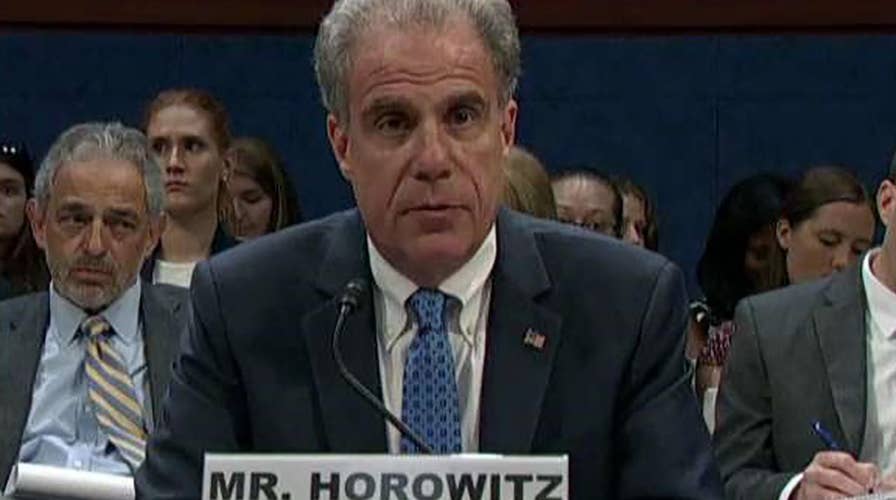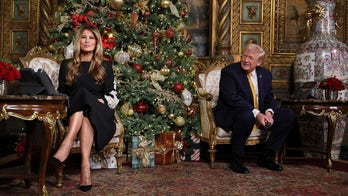Horowitz reviewing if Strzok's bias affected Russia probe
Inspector general Michael Horowitz testifies before joint hearing of the House Judiciary and Oversight Committees on whether anti-Trump FBI agent Peter Strzok's political bias affected the initiation of Special Counsel Robert Mueller's investigation.
Justice Department Inspector General Michael Horowitz confirmed Tuesday that he is investigating whether FBI official Peter Strzok’s anti-Trump bias factored into the launch of the bureau’s Russia probe.
During a joint hearing before the House Oversight and Judiciary committees, Horowitz testified that his office was reviewing Strzok’s anti-Trump text messages as part of a separate probe related to the Russia investigation.
“It clearly shows a biased state of mind,” Horowitz said, referring to text messages written as the FBI probe of Hillary Clinton's private email use was wrapping up and the Russia probe was getting underway.
The most infamous text, revealed in last week's IG report on the Clinton email case, showed Strzok responding "We'll stop it" when his colleague and lover Lisa Page sought assurances that Trump would not become president.
House Judiciary Committee Chairman Bob Goodlatte, R-Va., questioned Horowitz on whether that apparent bias influenced the initiation of the investigation into Russia interference in the 2016 campaign and potential collusion with Trump's team.
“That’s a matter we’ve got under review and are looking at right now,” Horowitz said.
It was revealed earlier this year that Horowitz’s office was investigating allegations of government surveillance abuse tied to the start of the Russia probe. But Horowitz’s testimony, meant to answer questions about the conclusion of the Clinton case review, revealed some of the specifics involved in the ongoing Russia case review, including the Strzok texts.
Goodlatte pressed Horowitz over the politically charged text messages -- which the report described as “hostile” -- and noted how several were sent near the start of the Russia probe.
“Correct,” Horowitz said. “In fact, there were these other text messages in roughly the same time period.”
The exchange came minutes after House Oversight Committee Chairman Trey Gowdy, R-S.C., also outlined the curious timing of a string of texts between Strzok and Page, just as the Russia probe, which Strzok was involved in, was beginning.
Gowdy laid out a timeline—beginning July 5, 2016 when Comey recommended no criminal charges against Clinton, to July 28, 2016, when the FBI initiated a counterintelligence investigation into the Russia issue.
“Three weeks after Clinton is exonerated by Comey, Strzok is leading the investigation into Russia and coordination with the Trump campaign,” Gowdy said Tuesday.
“And damn this feels momentous. Because this matters. The other one did, too, but that was to ensure we didn’t F something up. This matters because this MATTERS,” Strzok texted just days after the Russia probe began in July 2016.
“It almost sounds like they were going through the motions with the Clinton investigation—but boy they sure were excited about the Russia one,” Gowdy said.
Gowdy noted that on Aug. 6, 2016, Page texted Strzok, who was leading the FBI’s Russia investigation, telling him that he was “meant to protect the country from that menace.”
But a new text revealed in Horowitz’s report last week, from Aug. 8, 2016, revealing Strzok vowing to “stop” Trump from becoming president.
According to the report, Page texted Strzok in August 2016 and said: “[Trump’s] not ever going to become president, right? Right?!”
“No. No he won’t. We’ll stop it,” Strzok responded.
Gowdy said that text message was evidence that Strzok had “already prejudged the outcome,” noting that Strzok “already determined Trump should not be president of the United States” just days into the investigation.
By August 15, 2016, Strzok and Page texted about an “insurance policy” should Trump become president.
“I want to believe the path you threw out for consideration in Andy’s office - that there’s no way he gets elected - but I’m afraid we can’t take that risk,” Strzok texted on Aug. 15, 2016. “It’s like an insurance policy in the unlikely event you die before you’re 40.”
Horowitz testified, in response to Gowdy’s timeline and the texts between Strzok and Page, that the bias found here was “extremely serious.”
“I can’t imagine FBI agents even suggesting that they would use their powers to investigate any candidate for office,” Horowitz said. “I thought this was completely antithetical to the core values of the department and extremely serious.”
The office of the inspector general, though, found no evidence that the bias found impacted prosecutorial decisions in the Clinton email probe.
























